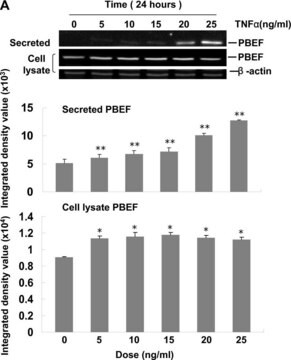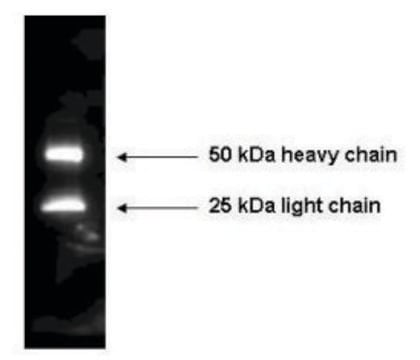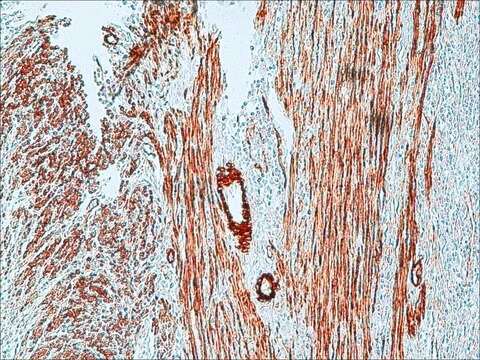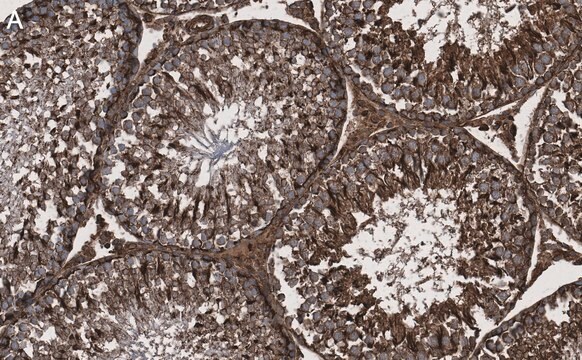ZRB2010
Anti-StAR Antibody, clone 1G15 ZooMAb® Rabbit Monoclonal

recombinant, expressed in HEK 293 cells
Sinonimo/i:
Steroidogenic acute regulatory protein, mitochondrial;START domain-containing protein 1;StARD1
About This Item
IHC
WB
immunohistochemistry: suitable
western blot: suitable
Prodotti consigliati
Origine biologica
rabbit
Livello qualitativo
Ricombinante
expressed in HEK 293 cells
Coniugato
unconjugated
Forma dell’anticorpo
purified antibody
Tipo di anticorpo
primary antibodies
Clone
1G15, recombinant monoclonal
Descrizione
1G15 Clone
Nome Commerciale
ZooMAb® learn more
Stato
lyophilized
PM
calculated mol wt 31.91 kDa
observed mol wt ~25 kDa
Purificato mediante
using Protein A
Reattività contro le specie
mouse, rat, human
Confezionamento
antibody small pack of 25 μL
Convalida avanzata
recombinant expression
Learn more about Antibody Enhanced Validation
sustainability
Greener Alternative Product
tecniche
immunocytochemistry: suitable
immunohistochemistry: suitable
western blot: suitable
Isotipo
IgG
Sequenza dell’epitopo
Unknown
N° accesso ID proteina
N° accesso UniProt
Categoria alternativa più verde
Condizioni di spedizione
ambient
Temperatura di conservazione
2-8°C
modifica post-traduzionali bersaglio
unmodified
Informazioni sul gene
human ... STAR(6770)
Categorie correlate
Descrizione generale
Specificità
Immunogeno
Applicazioni
Evaluated by Western Blotting in K562 cell lysate.
Western Blotting Analysis: A 1:10,000 dilution of this antibody detected StAR in K562 cell lysate.
Tested Applications
Western Blotting Analysis: A 1:1,000 dilution from a representative lot detected StAR in lysate from Human adrenal tissue and 1:10,000 dilution in lysates from mouse and rat adrenal tissue.
Immunocytochemistry Analysis: A 1:100 dilution from a representative lot detected StAR in K562 cells.
Immunohistochemistry (Paraffin) Analysis: A 1:1,000 dilution from a representative lot detected StAR in human adrenal gland tissue sections.
Note: Actual optimal working dilutions must be determined by end user as specimens, and experimental conditions may vary with the end user.
Descrizione del bersaglio
Stato fisico
Ricostituzione
Stoccaggio e stabilità
Note legali
Esclusione di responsabilità
Non trovi il prodotto giusto?
Prova il nostro Motore di ricerca dei prodotti.
Codice della classe di stoccaggio
11 - Combustible Solids
Classe di pericolosità dell'acqua (WGK)
WGK 1
Punto d’infiammabilità (°F)
Not applicable
Punto d’infiammabilità (°C)
Not applicable
Scegli una delle versioni più recenti:
Certificati d'analisi (COA)
Non trovi la versione di tuo interesse?
Se hai bisogno di una versione specifica, puoi cercare il certificato tramite il numero di lotto.
Possiedi già questo prodotto?
I documenti relativi ai prodotti acquistati recentemente sono disponibili nell’Archivio dei documenti.
Il team dei nostri ricercatori vanta grande esperienza in tutte le aree della ricerca quali Life Science, scienza dei materiali, sintesi chimica, cromatografia, discipline analitiche, ecc..
Contatta l'Assistenza Tecnica.






